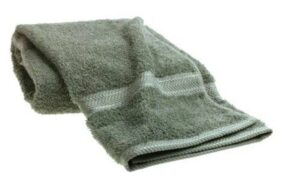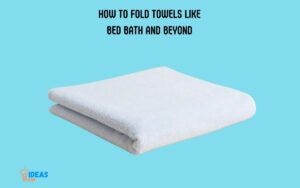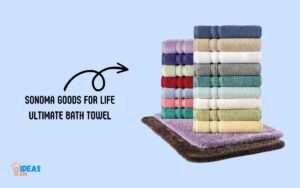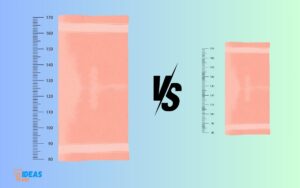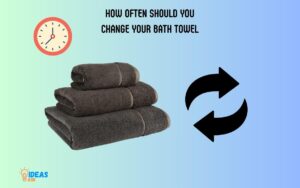Should Fabric Softener Be Used on Bath Towels? No!
No, fabric softener should not be used on bath towels. Fabric softeners may make bath towels feel soft and smell fresh, but they also reduce the towel’s absorbency. So, while your towels might smell pleasing, they may not successfully dry your body or dishes.
While fabric softeners can make your clothes feel softer and smell delightful – in the case of bath towels, they can do more harm than good.
When it comes to bath towels, it’s less about softness and more about absorbency. The residue from fabric softeners can cover the fibers of the towel, causing it to be less absorbent.
To keep your towels performing at their best, it’s recommended to skip the fabric softener and opt for alternative methods of softening – such as using a cup of white vinegar during the rinse cycle.
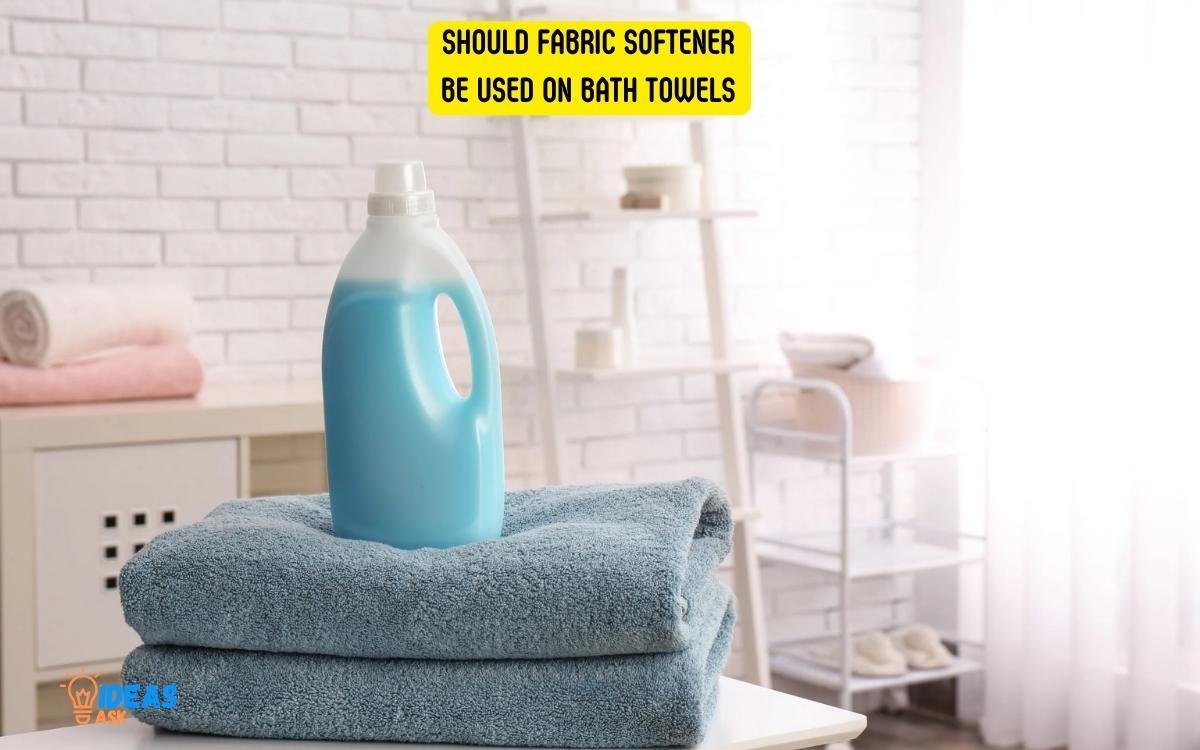
Key Takeaway
Understanding Fabric Softeners And Their Purpose
Fabric softeners can be used on bath towels to enhance their softness and reduce static cling. However, some experts suggest avoiding fabric softeners as they can reduce the absorbency of towels over time.
Fabric softeners are commonly used in laundering to enhance the comfort and feel of clothes, including bath towels. They come in various forms, including liquid, dryer sheets, and dryer balls.
Before deciding whether to use fabric softener on your bath towels, it’s essential to understand what fabric softeners are and why they are used.
Let’s delve into the explanation of fabric softeners and their purpose.
Explanation Of Fabric Softeners
Fabric softeners are products designed to improve the texture and quality of fabrics, making them softer and more pleasant to touch.
They primarily work by depositing a thin layer of chemicals onto the fibers of the fabric. This layer reduces friction between fibers, making the fabric feel smoother and more flexible.
Additionally, fabric softeners can minimize static cling, reduce wrinkles, and aid in releasing odors from the fabric. However, it’s important to note that not all fabric softeners are suitable for use on all types of fabrics.
Here’s a breakdown of the purpose of fabric softeners:
The Purpose Of Fabric Softeners
- Softening: Fabric softeners are designed to soften fabrics, including bath towels, resulting in a more luxurious feel against your skin.
- Reducing Static Cling: Static cling can be a nuisance, causing fabrics to stick together or to your body. Fabric softeners help reduce static cling, making it easier to separate and wear clothes comfortably.
- Enhancing Fabric Durability: By reducing friction and preventing fibers from rubbing against each other, fabric softeners can help extend the lifespan of bath towels.
- Smoothing Wrinkles: Fabric softeners can reduce the appearance of wrinkles, making your towels look neater and more aesthetically pleasing.
- Adding Fragrance: Many fabric softeners contain fragrances that impart a pleasant scent to freshly laundered linens, adding an extra touch of freshness to your bath towels.
Can Fabric Softeners Be Used On All Types Of Fabrics?
While fabric softeners can benefit most types of fabrics, it’s essential to consider the fabric composition and care instructions of your bath towels before using softeners.
Some fabrics, such as microfiber or certain synthetic materials, may be less compatible with fabric softeners.
Here are a few factors to keep in mind:
- Microfiber: Fabric softeners can impair the absorbency capabilities of microfiber towels. It is often recommended to avoid using fabric softeners on microfiber products to maintain their optimal performance.
- Flame-retardant Fabrics: Softeners may reduce the effectiveness of flame retardant finishes on fabrics, compromising their safety properties.
- Specific Care Instructions: Always check the care label instructions before using fabric softeners on your bath towels. Some towels may be specifically labeled as not suitable for fabric softener use.
Understanding fabric softeners and their purpose is crucial when deciding whether to use them on bath towels.
While fabric softeners can enhance the softness and comfort of towels, it’s essential to consider the fabric type and any specific care instructions that may advise against their use.
By making an informed decision, you can ensure your bath towels maintain their quality and performance over time.
Impact Of Fabric Softeners On Bath Towels
Fabric softeners may negatively impact bath towels by reducing their absorbency and causing a buildup of residue. This can result in towels feeling less fluffy and less effective at drying.
Using fabric softeners on bath towels can have both positive and negative effects. It’s important to consider how fabric softeners may impact the absorbency and overall quality of your towels.
Here are some key points to consider:
How fabric softeners affect the absorbency of towels
Fabric softeners typically contain ingredients that leave a residue on the fibers of the towel. This residue can create a barrier that hinders the towel’s absorbency. As a result, using fabric softeners may reduce the towel’s ability to soak up moisture effectively.
Potential damage caused by fabric softeners
Fabric softeners can also potentially damage your bath towels over time. The chemicals in these products can break down the fibers, making them less durable and more prone to fraying or tearing.
Additionally, the use of fabric softeners may cause the towel to lose its plushness and become rougher in texture.
Research and studies on the effects of fabric softeners on towels
Several research studies have been conducted to examine the effects of fabric softeners on towels.
These studies have highlighted the following findings:
- Fabric softeners can reduce the absorbency of towels by up to 35%, making them less effective in drying off the body or hair.
- The repeated use of fabric softeners can lead to a build-up of residue on towels, which can create an environment for bacteria growth.
- Towels washed without fabric softeners retain their absorbency and softness over a longer period compared to those washed with fabric softeners.
Considering these factors, it’s important to weigh the benefits of using fabric softeners, such as adding fragrance and reducing static, against the potential drawbacks on the absorbency and longevity of your bath towels.
Alternatives To Fabric Softeners For Bath Towels
Discover natural alternatives to fabric softeners for bath towels that will keep them soft and absorbent without the risk of residue buildup. From vinegar to dryer balls, these options are safe, effective, and environmentally friendly.
Natural Alternatives For Softening Towels:
- Vinegar: Add 1/2 cup of white vinegar to the rinse cycle to remove residue and make towels softer.
- Baking soda: Sprinkle 1/2 cup of baking soda directly on the towels before each wash to soften and freshen them.
- Dryer balls: Toss a few dryer balls into the dryer with your towels to help fluff them up and reduce static without the need for fabric softeners.
- Essential oils: Add a few drops of your favorite essential oil, such as lavender or eucalyptus, to a damp washcloth and throw it in the dryer with your towels for a natural fragrance and added softness.
Tips For Maintaining Softness Without Fabric Softeners:
- Use a gentle laundry detergent: Opt for a mild detergent formulated for sensitive skin to avoid any residue buildup that may affect towel softness.
- Avoid over-drying: Remove towels from the dryer while they are still slightly damp to prevent them from becoming stiff and rough.
- Shake out towels before drying: Give your towels a quick shake before placing them in the dryer to help fluff them up and reduce wrinkling.
- Skip the fabric softener dispenser: If your machine has a fabric softener dispenser, avoid using it for towels as the residue can make them less absorbent.
Pros And Cons Of Using Fabric Softener Alternatives:
Pros:
- Environmentally friendly: Natural alternatives are free from harmful chemicals, making them safe for both your family and the environment.
- Cost-effective: Fabric softener alternatives are often more budget-friendly than traditional fabric softeners.
- No residue build-up: Unlike fabric softeners, natural alternatives tend to leave little to no residue on towels, ensuring they remain absorbent.
Cons:
- Not as long-lasting: While fabric softener alternatives can make towels softer and fluffier, their effects may not be as long-lasting as traditional fabric softeners.
- Scent might not last: If you enjoy the long-lasting scent of fabric softeners, natural alternatives may not provide the same level of fragrance.
Remember, there are various natural alternatives for softening bath towels, and by following a few simple tips, you can ensure that your towels remain soft and absorbent without the use of fabric softeners.
Experiment with different methods and find what works best for you, your towels, and the environment.
Tips For Using Fabric Softeners On Bath Towels (If Desired)
Fabric softener can be used on bath towels to add a soft and fluffy feel. However, it is important to use it sparingly to avoid reducing the towels’ absorbency.
Follow these tips to effectively use fabric softener on your bath towels, if desired. Fabric softeners can be a divisive topic when it comes to bath towels.
While some people enjoy the softness and fragrance they provide, others worry about potential damage to the towels’ absorbency and durability.
If you decide to use fabric softeners on your bath towels, here are some tips to keep in mind:
Proper Usage Guidelines For Fabric Softeners
- Choose a fabric softener specifically designed for towels: Look for a fabric softener that is labeled safe for use on towels. These products are typically formulated to minimize any negative impact on absorbency.
- Use the correct amount: Follow the manufacturer’s instructions to determine the appropriate amount of fabric softener to use. Using too much can lead to an excessive buildup that may compromise the towels’ absorbency.
- Add fabric softener during the rinse cycle: Adding fabric softener during the rinse cycle helps ensure that it is properly dispersed and minimizes any potential residue on the towels.
- Consider using dryer sheets instead: If you are concerned about the impact of liquid fabric softeners, dryer sheets can be a good alternative. They can impart a subtle fragrance and softness without direct contact with the towels.
Recommendations For Specific Types Of Fabric Softeners
- Liquid fabric softeners: Liquid fabric softeners are versatile and can be easily added to the rinse cycle. Look for those labeled safe for towels, and follow the usage guidelines provided.
- Dryer sheets: Dryer sheets are a convenient option as they can be simply tossed into the dryer with the towels. They provide a subtle fragrance and minimize static cling.
- Natural alternatives: If you prefer more natural options, consider using vinegar or baking soda. Vinegar can act as a softening agent and remove any lingering odors, while baking soda helps to soften and freshen the towels.
Mitigating Potential Damage From Fabric Softeners
- Use fabric softeners sparingly: Overusing fabric softeners can lead to buildup and reduce the towels’ absorbency. Use them only occasionally or opt for alternative methods of softening.
- Avoid using fabric softeners on highly absorbent towels: If you have towels that are known for their exceptional absorbency, it may be best to forgo fabric softeners altogether to maintain their performance.
- Rinse towels thoroughly: To ensure any fabric softener residue is removed, rinse towels thoroughly after washing. This can help minimize any potential impact on absorbency.
Remember, using fabric softeners on bath towels is a personal choice. Some people love the added softness and fragrance, while others prefer the natural feel of their towels.
Consider experimenting to find the best approach that suits your preferences and maintains the longevity of your bath towels.
Caring For And Extending The Life Of Bath Towels
Maintaining the longevity and softness of bath towels is crucial, but should you use fabric softener on them?
Many experts advise against it, as the chemicals in fabric softener can build up over time, reducing the towel’s absorbency. Instead, opt for natural alternatives like vinegar or baking soda to keep your towels in top condition.
When it comes to caring for bath towels, it’s essential to take proper steps to ensure their longevity. Proper care not only extends the life of your towels but also maintains their freshness, absorbency, and softness.
We will outline some general tips for caring for bath towels, discuss ways to maintain their cleanliness and freshness, and provide alternative methods to maximize absorbency and softness without the use of fabric softeners.
General Tips For Caring For Bath Towels:
- Wash new towels before using them to remove any manufacturing residue and improve absorbency.
- Use a mild detergent to avoid harsh chemicals that can degrade towel fibers.
- Wash towels separately, especially for the first few washes, to prevent lint transfer from other fabrics.
- Avoid using bleach as it can weaken towel fibers and cause discoloration.
- Opt for warm water instead of hot water to prevent shrinkage and damage to the towel fibers.
- Do not overload the washing machine to allow sufficient space for thorough cleaning.
Maintaining Towel Cleanliness And Freshness:
- Hang towels after each use to allow air circulation and prevent the growth of bacteria and mold.
- Wash towels regularly to remove oils, dirt, and residue that can build up over time.
- Avoid using fabric softeners as they can leave a coating on towels that reduces absorbency and freshness.
- Use baking soda as a natural deodorizer by adding half a cup during the wash cycle.
- Consider adding distilled white vinegar to remove any leftover detergent residue and maintain towel softness.
- Dry towels completely before storage to prevent musty odors and mildew growth.
Maximizing Towel Absorbency And Softness Without Fabric Softeners:
- Use vinegar as a fabric softening alternative by adding half a cup during the rinse cycle.
- Opt for wool dryer balls to fluff and soften towels without the use of chemicals.
- Avoid over-drying towels, as it can lead to roughness and decrease absorbency.
- Give towels a good shake before folding to keep the fibers loose and maintain softness.
- Consider using cotton towels, which are known for their absorbency and natural softness.
- Avoid using excessive detergent, as it can build up and make towels stiff.
By following these tips, you can ensure the longevity of your bath towels while maintaining their cleanliness, freshness, absorbency, and softness.
Remember, caring for your towels properly not only enhances your bathing experience but also saves you money in the long run by avoiding the need for frequent towel replacements.
Conclusion
The decision of whether to use fabric softener on bath towels ultimately depends on personal preference.
While some people enjoy the softness and scent that fabric softener provides, others may find that it reduces the towels’ absorbency and affects their performance.
It is important to consider the type of fabric softener being used and to follow the manufacturer’s instructions carefully.
Alternatively, there are natural alternatives like vinegar or baking soda that can help soften towels without the potential drawbacks of traditional fabric softeners.
Ultimately, the goal should be to keep your bath towels clean, fresh, and absorbent. Regular washing, proper drying techniques, and avoiding excessive use of fabric softener are all important factors to consider when caring for your towels.

